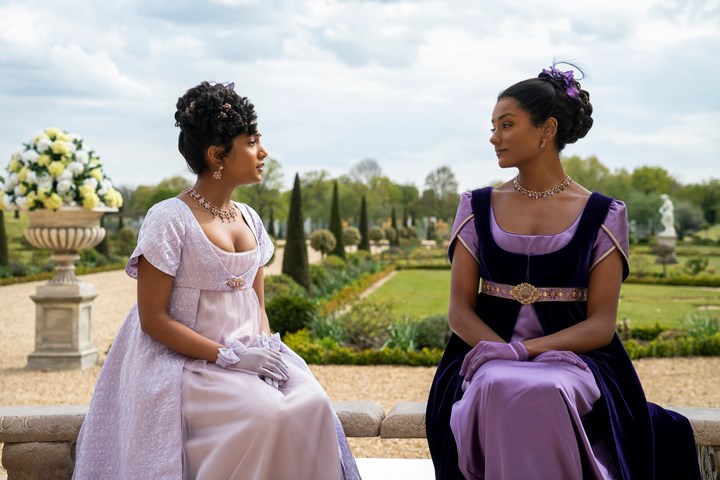
We need to talk about “Bridgerton.”
I have questions. Lots of them.
I have read every Bronte, Eyre, Louisa May Alcott, and watched almost every adaptation, BBC or not, of their books. I was that nerdy Indian girl in your class that asked everyone to call her “Anne with an E” (after Anne of Green Gables of course). I was in drama club, I can flawlessly recite every line of Sense and Sensibility, including the cadence of their accents. I am capable of understanding satire, irony, and flights of fancy. In all ways that count I am the peak demographic of this show. And yet still I don’t understand why we NEED the Sharma sisters of “Bridgerton,” season two.
What part of representation is ours, actually? And who is it for? Is it to romanticize and glorify the brutal 400 years of British occupation, where our political, social, cultural and material wealth was irreplaceably stolen? Is it for those who deny colorism and casteism don’t exist, and the proof is in our melanated celebrities, even though all of them are upper caste, including our own vice president?
[Read Related: In Conversation with Charithra Chandran: the Youngest Sharma to Join ‘Bridgerton’ as this Season’s Diamond]
Mindy Kaling, Priyanka Chopra, Maitrey Ramakrishna, and now the Sharma sisters — why don’t we get representation without the presence of the white male? Why must our women always find themselves contending with the over-inquisitive, chatty yet charming womanizer ala Schmidt in “New Girl,” or Danny Castellano of “The Mindy Project,” or Ben Gross of “Never Have I Ever“? These men are always debating, teasing, mansplaining, and arguing down the women around them – only to redeem themselves by our women falling madly in love with them.
The one-on-one romances, fine. I can see the appeal of allowing our bodies and faces to champion that long-standing genre of the romantic comedy, especially when it is so close in plot and rhetoric as the Bollywood we are essentialized by. It can be exciting and freeing to watch a South Asian woman of any background, regardless if we share one, own her sexuality and wit onscreen against these problematic, albeit familiar tropes. Because of our racialized bodies, so many of us are sexualized before puberty that to see one of our women stand proudly in that sexuality is unequivocally amazing. Even if Schmidt, SRK, Salman Khan, Anthony Bridgerton, and the dude from “Never Have I Ever” are the same revolving door sequence of toxic masculinity.
The same toxic masculinity, in fact, that yells at me from across the bar while I’m working and demands pithy debates about the usefulness of the British in India – roads! It yells you didn’t have roads! The same type of person that will ask me over and over where I’m from or what my name means, the same toxic masculinity that is waiting for their spirited, well-read, drop-dead gorgeous Indian crush to hurry up and accept patriarchy into her heart.
More importantly, dear reader, what do you see when you see these celebrities? Do you see anyone you know? Or is your desire to fix the inequities of representation so strong that you’d rather just take it?
[Read Related: Closing the Gap for South Asian Representation on Screen]
I want more. I deserve more than a fantasy of inclusion written by a white woman about our bodies in the colonial past when we know full well what our bodies would have looked like in the colonial past. “Bridgerton” was a painful fantasy, watching all the ways things weren’t, all the ways whiteness does not work. In my daylong binge, I tried not to feel the twinge of pain every time Duchess-whats-her-name bounced her adorable Black baby on her knee and cooed, thinking why couldn’t have it been like that? Or when Edwina was crowned the Diamond of the Season, pain when she was embraced and accepted, not ridiculed and picked apart. And yes, even pain when I took in the full vision board of their outfits – a mashup somewhere between 2007 David’s Bridal and your mom’s broken jewelry drawer that nobody asked for. (At least these shows in their misrepresentation of our clothing are consistent, I thought, pausing for a moment of silence for the Patil sisters’ Yule Ball attire).
View this post on Instagram
Sadness at the scene at dinner, where the Sheffields caused a ruckus and highlighted the Bridgertons as the safe white family, cringe at the garden pavilion sex created for the kama sutra-obsessed white men that will always exoticize us, eyeroll upon eyeroll at the instrumental version of “Kabhi Khushi Kabhie Gham,” a perfect connection to an equally problematic movie.
[Read Related: ‘The Best way Possible’: Simone Ashley on her Whirlwind ‘Bridgerton’ Success and Celebrating South Asian Excellence]
My sister pointed out to me that there were, of course, people of color all over England and in Europe for time immemorial.
“There are people out here who think that in the ‘past,’ England was all white all the time,” she said to me passionately over WhatsApp voice texts. “Populations have changed over the years but we have always been there in the past. And I do want to hear their stories. I like how Bridgerton pushed back against that, but it completely shirked acknowledging the complexity of their lives.”
To which I say, kick the doors down and let the flood of South Asian writers who can tell those stories into the drawing room! I am listening, and I am hungry for them.
It is violence to live in such fantasies when our current global understanding of the effects of European colonialism is so contentious. The only person for whom any of these plots are a true fantasy is white. Watch the shows and consume them like a guilty pleasure, but please let’s not trick ourselves into thinking they are changing anything.




